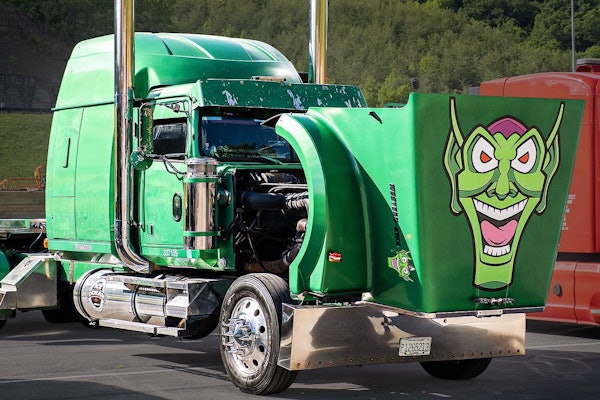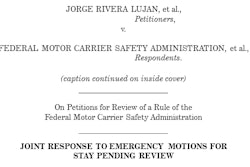
It’s been nearly five years since Groendyke Transport petitioned the Federal Motor Carrier Safety Administration to add a flashing brake light to the rear of their tanker trucks to increase visibility and reduce collisions.
After being ticketed several times for their flashing brake light, Groendyke eventually received their exemption and was recognized by Commercial Carrier Journal in 2020 as an Innovator of the Month.
That same year, as more tanker fleets signed up for flashing brake light exemptions from FMCSA, the agency granted a blanket waiver to the National Tank Truck Carriers allowing tanker fleets to install a red or amber brake light that flashes when brakes are applied.
More fleets have since followed Groendyke’s example and have added a flashing brake light which studies from the National Highway Traffic Safety Administration have shown can increase safety.
“It feels wonderful,” said John James, Groendyke’s transport director of equipment and procurement. “Anything we can do to increase the safety of the motoring public is not only a win for us, but for everyone.”
However, not all trucks are benefitting from pulsing brake lights and Intellistop CEO Michelle Hanby is out to change that.

Intellistop produces a module by the same name that quickly attaches to the nosebox of a tractor trailer and pulses the existing brake lights four times in under a second before glowing steadily when the brakes are applied.
[Related: FMCSA proposes Safety Measurement System revamp]
Hanby reports that fleets continue to sign up for the device given its relatively low cost and fast installation which does not require an additional light to be installed. The biggest problem? Intellistop’s exemption was rejected by the FMCSA. After waiting nearly two years for a decision from the agency which normally takes 180 days, Hanby sued for a response and her device was ultimately rejected.
 This truck from Meiborg Brothers Trucking was demolished after being slammed from behind by another tractor-trailer a few months ago in Houston on Interstate 69. The driver that slammed into the back of the truck was killed while the driver in the Meiborg truck was not injured. Meiborg President and CEO Zach Meiborg thinks the outcome may have different if their truck had been equipped with pulsing brake lights which provide greater visibility.Meiborg Brothers Trucking
This truck from Meiborg Brothers Trucking was demolished after being slammed from behind by another tractor-trailer a few months ago in Houston on Interstate 69. The driver that slammed into the back of the truck was killed while the driver in the Meiborg truck was not injured. Meiborg President and CEO Zach Meiborg thinks the outcome may have different if their truck had been equipped with pulsing brake lights which provide greater visibility.Meiborg Brothers Trucking
Hanby has challenged the decision in U.S. District Court and remains encouraged by the number of fleets that keep coming forward to apply for an exemption to use Intellistop. She’s hoping to win her case so that fleets will not have to work through a time-consuming exemption process and instead will have the option of spec’ing the device at the factory level.
“It’s just heartbreaking because you see all the stuff they deal with when it comes to regulations and fleets want to do the right thing,” Hanby said from her company's headquarters in Fayetteville, Arkansas. “They want to do the best thing. They don't want to be in any kind of regulatory trouble and yet they have to battle for something so simple.”
Plugging along regardless of rejection
As it stands now, FMCSA will only grant exemptions for fleets that install Intellistop themselves. However, a growing number of fleets including Meiborg Brothers Trucking in Rockford, Illinois, are hoping that an exemption will soon include factory installation.“I believe in the product,” Meiborg Brothers President and CEO Zach Meiborg said. “It really helps draw attention when you apply the brakes.”
Meiborg applied for an exemption to install Intellistop and will add the device to their equipment which includes mostly dry vans. It’s a positive change that can’t come soon
About three months ago, one of Meiborg’s trucks was struck hard from behind while stopped in traffic on I-69 just north of Houston. That truck was not equipped with Intellistop.
“Another tractor-trailer came up over the hill behind him, didn't see him and rear-ended him at 70 miles an hour,” Meiborg said.
 Intellistop's brake light pulsing device can be installed quickly to the nosebox of a tractor trailer where it will pulse the brake lights four times in under a second before glowing steadily when the brakes are applied.Intellistop
Intellistop's brake light pulsing device can be installed quickly to the nosebox of a tractor trailer where it will pulse the brake lights four times in under a second before glowing steadily when the brakes are applied.Intellistop
“It hit our truck so hard that it actually flipped it over up and on its side,” Meiborg said. “So yes, it’s pretty significant. This stuff does happen and I believe if you could draw more attention to a stopping vehicle, then it absolutely could save lives and help encourage a safer environment.”
Gemini Motor Transport, the primary fuel hauler for Love’s travel stops, recently applied for an exemption to use Intellistop to pulse their brake lights which includes an LED rope light that encircles the rear of their new tankers. In the meantime while waiting for a response from FMCSA, they’ll continue to use Intellistop which can mean racking up some violations.
“When we first saw the device, we jumped on it because we feel like anything that can help catch the attention of somebody following one of our trucks is going to greatly improve safety not only for our drivers but for the motoring public,” said Jim Dillon, Gemini’s truck assets manager.
Rear-end collisions remain a deadly and costly industry-wide threat. Dillon said 43% of their reportable accidents last year resulted from drivers slamming into the back of their trailers.
It’s numbers like that that have Hanby, Dillon and Meiborg concerned and disappointed by FMCSA’s rejection of Intellistop’s request to have the device installed at the factory level.
In its denial letter to Intellistop, FMCSA cites the Motor Vehicle Safety Act administered by NHSTA which states that “[a] manufacturer, distributor, dealer, rental company, or motor vehicle repair business may not knowingly make inoperative any part of a device or element of design installed on or in a motor vehicle or motor vehicle equipment in compliance with an applicable motor vehicle safety standard prescribed under this chapter,” other than to make repairs.
While FMCSA said it can approve exemptions for fleets to add Intellistop, as it stands now the Motor Vehicle Safety Act prohibits installation at the factory level.
That’s something that Hanby will continue to challenge.
“We worked with fleets and asked, ‘What do you want? What works best for you?’ We talked with trailer manufacturers and asked, ‘What works best for you?’” Hanby said and added that both fleets and trailer manufacturers answered that they would rather have the option of installing Intellistop at the factory.
“Fleets want to be able to get this at the manufacturer. They want to be able to get it as a line item and add it to their equipment and just get it and hook up and go which makes sense,” she said.














